新标准七上m7u3
2019外研版英语七年级上册Module7Unit3教案精品教育.doc
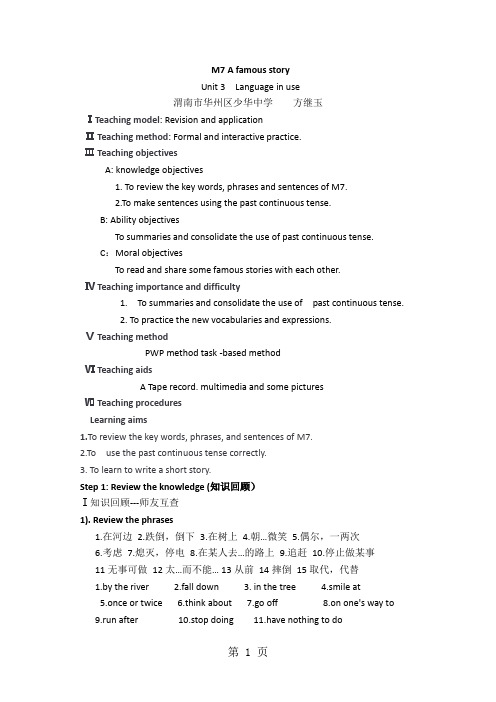
M7 A famous storyUnit 3 Language in use渭南市华州区少华中学方继玉ⅠTeaching model: Revision and applicationⅡ Teaching method: Formal and interactive practice.Ⅲ Teaching objectivesA: knowledge objectives1. To review the key words, phrases and sentences of M7.2.To make sentences using the past continuous tense.B: Ability objectivesTo summaries and consolidate the use of past continuous tense.C:Moral objectivesTo read and share some famous stories with each other.Ⅳ Teaching importance and difficulty1. To summaries and consolidate the use of past continuous tense.2. To practice the new vocabularies and expressions.Ⅴ Teaching methodPWP method task -based methodⅥ Teaching aidsA Tape record. multimedia and some picturesⅦ Teaching proceduresLearning aims1.To review the key words, phrases, and sentences of M7.2.To use the past continuous tense correctly.3. To learn to write a short story.Step 1: Review the knowledge (知识回顾)Ⅰ知识回顾---师友互查1). Review the phrases1.在河边2.跌倒,倒下3.在树上4.朝…微笑5.偶尔,一两次6.考虑7.熄灭,停电8.在某人去…的路上9.追赶10.停止做某事11无事可做12太…而不能… 13从前14摔倒15取代,代替1.by the river2.fall down3. in the tree4.smile at5.once or twice6.think about7.go off8.on one's way to9.run after 10.stop doing 11.have nothing to do12.too...to 13.once upon a time 14.take the place of(师友先自己完成,再相互检查)2). Review the important drills课文原句在现1.Alice was sitting with her sister by the river.2.It was sitting in a tree and smiling at everyone.3.It was too dark for her to see anything.4.While she was falling, she was thinking about her cat.5.It was very polite of you to sit down.6.They were having a tea party in the garden.7.Where was it going?Ⅰ知识回顾—2.教师点评过去进行时态:主语+was/ were+doing.Do--doing:1.一般情况直接加ing . talk--talking call--calling buy--buying.2 .以哑e结尾去饿加ing. take--taking3 以重读闭音节结尾,末尾只有一个辅音字母,双写+ing. run--runningsit--sitting stop--stopping特殊:lie -- lyingStep 2 Explanation 题型讲解II.题型讲解—1.师友互讲1). Underline the correct words.1 Suddenly, all the lights in my house_________ . There was heavy rain outside.2 —I called you up at seven o’clock last night, but nobody answered it. —Really? I’m sorry, but I _____________ a piano lesson at school.3 —I ______you and Tom in the library just now.—Oh, we________________several visitors around the school.2).Write down what each member of your group was doing at eight o’clock last night. Sun Li was watching TV at eight o’clock last night.1___________________________________________2___________________________________________3___________________________________________4___________________________________________1 The dog is ___ the cat in the garden.2__________is this machine____________ ?3 He ______________ and was very bored.4 She is_____________how to finish the story.5 I wrote to him_________________ , but he did not answer.(师友自己练习,学友讲给师傅听,师傅纠正错误,并说明原因,师傅帮助学友完善笔记)II.题型讲解—2.教师归纳1.过去进行时与一般过去时的区别:一般过去时与过去进行时都是发生在过去。
外研(新标准)版七年级上Module7 Computers Unit3 Language in use课件(共28张PPT)
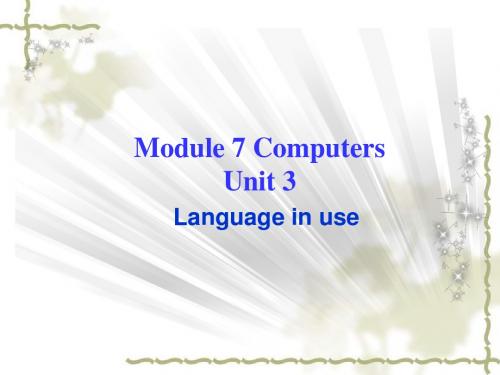
A: The birthday party is coming , let’s buy some gifts. B: Sure. Any good ideas ? A: I’d like to buy a sweater. They feels warm and comfortable. B: That’s a good idea. Let’s go.
sweet. They taste soft. hard.
look fresh. They
taste sweet. sour
look fresh.
They
taste sweet.
It tastes
delicious.
cool.
smellபைடு நூலகம் fresh. It tastes delicious.
A: The birthday party is coming , let’s buy some gifts. B: Sure. Any good ideas ? A: I’d like to buy a sweater. They feels warm and comfortable. B: That’s a good idea. Let’s go.
The party _____________ sounds noisy .
1. The cakes taste ______________. delicious 2. The bananas ____________. smell good 3. The students ____________. look happy 4. The flowers ____________. smell sweet seems friendly 5. The teacher _______________. 6. The juice ______________. tastes sour 7. The chair ___________________. feels comfortable sounds beautiful 8. The music _________________.
外研版七年级英语上册教案 Module7 Unit3

M7U3课时备课5.通过对不同地区人们使用电脑情况的了解,提高对英语学习的积极性知识经验:1. Tom _______ his email every Saturday.2. I have a computer, but I don’t ____ it.3. Come to my office. Let’s _____ for our holiday.4. My mother doesn’t _______ computer games.5. I can _______ to my friends on the Internet.题目:My computer.词数不少于100词。
(注意特殊疑问句正确使用)句型转换1. The girl often sends her mother some emails.(改为同义句)The girl often _______ some emails _______ her mother.2. His sister works in a clothing store.(改为否定句)His sister _______ __________ in a clothing store.3. Next, I wash my hands.(对划线部分提问)____________________________________________4. Wang Fei usually has lunch at school.(改为一般疑问句)______ Wang Fei usually ________ lunch at school?5. People like bedrooms because they like sleeping. (对划线部分提问)_______ _______ people like bedrooms?1.通过阅读表达的文章构架,指导学生构建写作框架:总--分--总2.组内交流(1)文章框架,(2)每个段落可以写哪些方面内容?如何表达?(3)选择独立完成作文,两人合作完成或是组内交流完成作文。
外研(新标准)版七年级上《Module 7 Computers Unit 3 Language in use》教案

电子教案年级:学科:教师:课题Unit 3 Language in use 共1课时主备教师使用教师备课日期上课日期教材分析教学目标1.语法:复习巩固一般现在时的用法,尤其是本模块所学的一般现在时特殊疑问形式2.词汇:①生词:holiday ②复习本模块所学的有关电脑方面的词汇4.听:能听懂所学的有关电脑方面的词汇;听懂一般现在时的特殊疑问句5.说:能就电脑的使用进行简单的问答;能运用一般现在时特殊疑问形式进行问答6.读:能读懂简单的特殊疑问句及其回答7.写:能结合本模块所学的语言知识,准确运用所学句型结构写出相关的表达8.认知策略:联系、归纳、推测等技能。
如能通过观察、应用,总结归纳出一般现在时特殊疑问句的用法9.调控策略:从同伴处得到反馈,对自己在叙述及书写中的错误进行修改10.合作学习策略:同学之间互相学习,取长补短了解不同国家和地区的人们使用电脑的情况通过学习电脑方面的词汇提高对英语的学习兴趣教学重难点1.复习巩固一般现在时的用法,尤其是本模块所学的一般现在时特殊疑问形式2.复习巩固本模块所学的电脑词汇及一些动宾搭配的使用。
3. 较熟练地运用本模块中所学的词汇和句型,区别应用助动词do, does课型Revision and application 授课方法Formal andinteractivepractice教具准备录音机;多媒体课件教与学的设计我的修改Chapter 1 Lead-in : Warming up(营造氛围,导入新课)Step 1 Warming-up 对本模块所学的含有行为动词的一般现在时的特殊疑问句进行复习, 帮助学生回忆前面所学语法,为任务的开展做好做好准备。
1.Greetings.2.含有行为动词的一般现在时的特殊疑问句的结构是“疑问词+一般疑问句语序(助动词用do或does)?”(疑问词作主语时除外)。
对时间状语进行提问要用疑问词when; 对地点状语进行提问要用疑问词where;对可数名词的数量进行提问要用疑问词how many3;对动作进行提问要用疑问词what;对表示人的词进行提问要用疑问词who。
Module 7 Unit 3 大单元整体教学设计 外研版英语七年级上册

一、模块主题本模块的话题是电脑。
计算机是现代信息技术的代表,已经影响到我们生活的方方面面。
学生通过本模块的学习,不仅能了解适合中学生应用需求的基本操作,同时还可以了解计算机的发展史。
本模块除了呈现与计算机相关的语言知识外,还涉及如何正确使用计算机,正确使用网络。
在教授本模块语言知识的同时要注意培养学生对待电脑和网络的正确态度。
二、模块内容分析U1通过对话介绍了如何建立新文档,如何保存和打印等适合中学生应用需求的基本操作。
通过学习,同学们能听懂与电脑操作相关的连续的指令,能在听力材料中辨认与电脑相关的信息,能听懂有关电脑操作的一般现在时的特殊疑问句并能简单描述或介绍电脑的相关操作。
U2本单元课文的语境是学校对学生使用计算机情况的调查,一些学生分别对when do you use a computer? 进行了回答,课文就是三个学生杰克,艾丽斯和迈克的回答。
这节阅读课,在练习从课文中提取信息的同时,同学们可以联系生活实际对网络的应用做出进一步的阐述,以达到加深对课文理解的目的。
U3本单元是一个练习单元,是通过练习和活动,对学生在本模块一,二单元中所学的电脑方面的基本词汇,一般现在时的特殊疑问句和答句等知识进行复习和巩固,使学生能更为透彻地理解,更为准确运用所学知识。
三、学情分析本节课的教学对象是七年级学生,这一阶段的学生思维能力发展较快,自我意识增强,有较强的求知欲和表现欲。
经过了小学六年的学习,学生已有了初步的自主学习,合作探究能力,但部分同学存在不自信,羞于表现等思想顾虑,因此在教学中要照顾到不同程度地学生。
四、模块教学目标通过本单元的学习,学生能够:目标a:熟练掌握学过的词汇。
目标b:能够描述怎样使用电脑。
目标c:一般现在时(当主语不是第三人称单数形式)的一般疑问句及其否定句目标d: 一般现在时的特殊疑问句单元课时安排语篇课型第*课时U1听说课第一课时U2阅读课第二课时U3语法课第三课时第3课时教学设计一、课题Module 7 computers Unit 3 Language in use二、课型听说课口语法课口阅读课口写作课口其它课口三、教材分析:What---语篇主题和主要内容是通过练习和活动,对学生在本模块一,二单元中所学的电脑方面的基本词汇,一般现在时的特殊疑问句和答句等知识进行复习和巩固,使学生能更为透彻地理解,更为准确运用所学知识。
最新外研版七年级上册英语m7知识点讲解
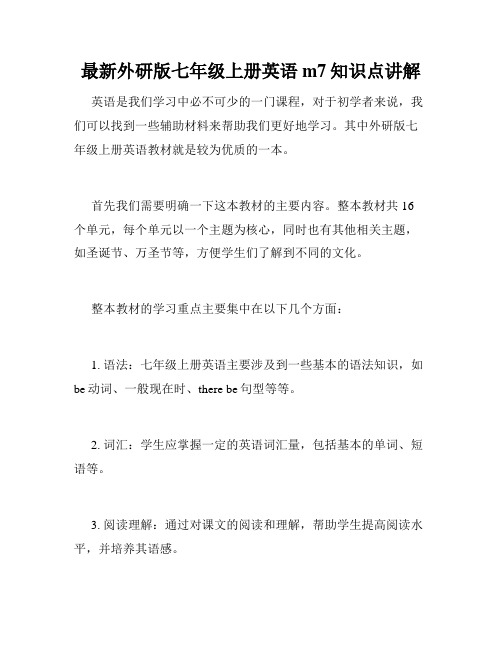
最新外研版七年级上册英语m7知识点讲解英语是我们学习中必不可少的一门课程,对于初学者来说,我们可以找到一些辅助材料来帮助我们更好地学习。
其中外研版七年级上册英语教材就是较为优质的一本。
首先我们需要明确一下这本教材的主要内容。
整本教材共16个单元,每个单元以一个主题为核心,同时也有其他相关主题,如圣诞节、万圣节等,方便学生们了解到不同的文化。
整本教材的学习重点主要集中在以下几个方面:1. 语法:七年级上册英语主要涉及到一些基本的语法知识,如be动词、一般现在时、there be句型等等。
2. 词汇:学生应掌握一定的英语词汇量,包括基本的单词、短语等。
3. 阅读理解:通过对课文的阅读和理解,帮助学生提高阅读水平,并培养其语感。
4. 口语:培养学生的口语能力,促进其在表达和交流方面的能力提高。
以上是七年级上册英语教材的学习重点,下面就针对其中的一些难点进行一些讲解。
一、be动词be动词在英语中是十分重要的,它可以用来表示状态、性质等等,也用来表示谓语。
在句子中,be动词有时是作谓语,有时则是作定语。
例如:This is a book. (be动词作谓语)The teacher is tall. (be动词作定语)与be动词相关的语法知识还包括一般疑问句、否定句等等,学生需要对这些知识有一个清晰的认识。
二、there be句型there be句型在英语中也很常见,它是指在某个地方存在某种事物或现象。
例如:There is a cat on the chair.There are some books on the desk.学生需要掌握there be句型的用法以及相关的语法知识。
三、数词数词是十分基础的英语知识,对于初学者来说是必须要掌握的。
七年级上册英语教材主要涉及到的数词有基数词和序数词,学生需要掌握它们的读音和用法。
四、时态时态是英语学习中不可避免的重点。
在七年级上册英语中,主要学习一般现在时态,如:I get up at six o'clock.(我六点起床)He goes to school by bus.(他坐公交车去上学)需要注意的是,时态是与具体情境相关联的,学生在学习时需要理解上下文,正确使用时态。
七年级英语上册Module7ComputersUnit3Languageinuse教案(新版)外研版
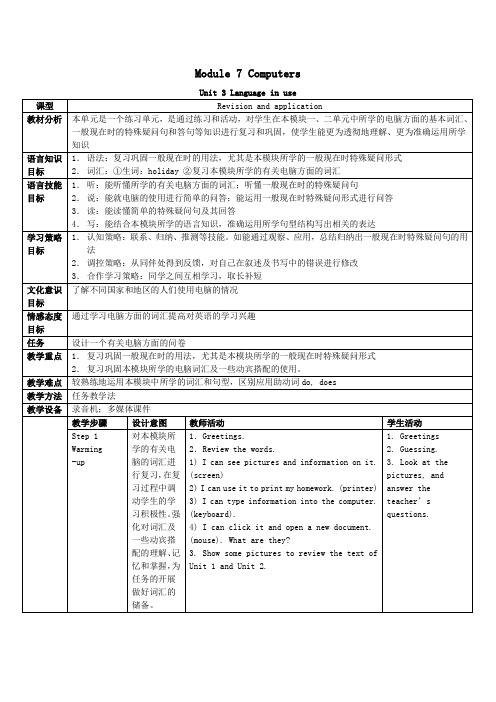
2. Work with the whole group. Make a survey about students and computers.
Step7 Do exercises
3. Call back the answers from the whole class, check the answers.
Keys: 1. b 2. c 3. d 4. a
4. Now work in pairs.
5. Ask and answer the questions.
1. Read through the sentences.
教学方法
任务教学法
教学设备
录音机;多媒体课件
教
学
过
程
教学步骤
设计意图
教师活动
学生活动
Step 1
Warming
-up
对本模块所学的有关电脑的词汇进行复习,在复习过程中调动学生的学习积极性。强化对词汇及一些动宾搭配的理解、记忆和掌握,为任务的开展做好词汇的储备。
1.Greetings.
2.Review the words.
3. Check the answers.
4. Read the sentences together loudly.
Step 4 Language practice
Activity 4
通过练习,加以巩固一般现在时的用法。
1. Read through the words in the box with the whole class.
外研版七年级英语上册教案:Module7Unit3Languageinuse

教学内容与课本紧密关联,旨在帮助学生巩固所学知识,提高英语实际运用能力。
二、核心素养目标
1.提升学生英语语言能力:通过学习本节课内容,使学生能够熟练运用一般现在时和现在进行时描述日常活动和正在进行的动作,提高学生的英语表达和沟通能力。
2.培养学生的跨文化交际意识:让学生在掌握目标语言的基础上,了解并尊重不同文化背景下的日常活动差异,提升学生的国际视野。
外研版七年级英语上册教案:Module7 Unit 3 Language in use
一、教学内容
外研版七年级英语上册教案:Module 7 Unit 3 Language in use
本节课主要围绕Module 7 Unit 3 Language in use展开,内容包括:
1.复习和巩固一般现在时和现在进行时的用法。
(二)新课讲授(用时10分钟)
1.理论介绍:首先,我们要了解一般现在时和现在进行时的基本概念。一般现在时用于描述习惯性动作或经常发生的事情,而现在进行时则用于描述说话时正在进行的动作。了解这两个时态对于准确表达非常重要。
2.案例分析:接下来,我们通过一个具体的案例来展示这两个时态在实际中的应用。案例中的人物正在做不同的事情,我们将学习如何正确使用时态来描述这些动作。
3.重点难点解析:在讲授过程中,我会特别强调一般现在时和现在进行时的区别,以及如何正确变换句型和动词形式。对于难点部分,我会通过对比和实际例子来帮助大家理解。
(三)实践活动(用时10分钟)
1.分组讨论:学生们将分成若干小组,每组讨论一个与描述正在进行的动作相关的实际问题。
2.实验操作:为了加深理解,我们将进行一个简单的角色扮演活动。学生们将模拟不同的场景,用英语描述正在进行的动作。
初一外语学科资源建设M7u3教案
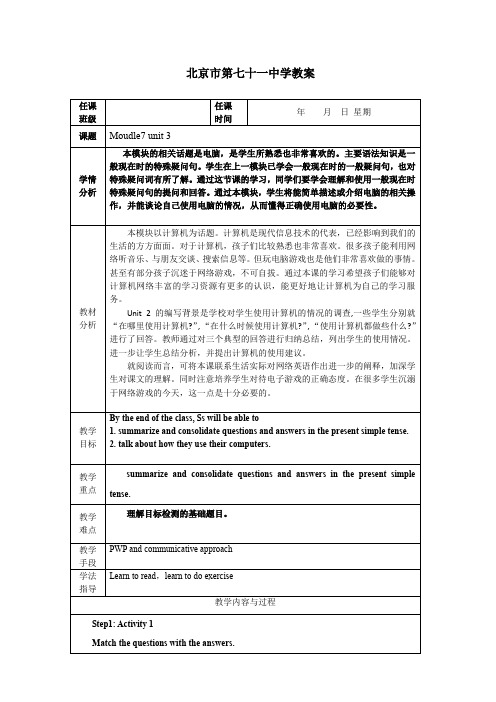
北京市第七十一中学教案任课班级任课时间年月日星期课题Moudle7 unit 3学情分析本模块的相关话题是电脑,是学生所熟悉也非常喜欢的。
主要语法知识是一般现在时的特殊疑问句。
学生在上一模块已学会一般现在时的一般疑问句,也对特殊疑问词有所了解。
通过这节课的学习,同学们要学会理解和使用一般现在时特殊疑问句的提问和回答。
通过本模块,学生将能简单描述或介绍电脑的相关操作,并能谈论自己使用电脑的情况,从而懂得正确使用电脑的必要性。
教材分析本模块以计算机为话题。
计算机是现代信息技术的代表,已经影响到我们的生活的方方面面。
对于计算机,孩子们比较熟悉也非常喜欢。
很多孩子能利用网络听音乐、与朋友交谈、搜索信息等。
但玩电脑游戏也是他们非常喜欢做的事情。
甚至有部分孩子沉迷于网络游戏,不可自拔。
通过本课的学习希望孩子们能够对计算机网络丰富的学习资源有更多的认识,能更好地让计算机为自己的学习服务。
Unit 2的编写背景是学校对学生使用计算机的情况的调查,一些学生分别就“在哪里使用计算机?”, “在什么时候使用计算机?”, “使用计算机都做些什么?”进行了回答。
教师通过对三个典型的回答进行归纳总结,列出学生的使用情况。
进一步让学生总结分析,并提出计算机的使用建议。
就阅读而言,可将本课联系生活实际对网络英语作出进一步的阐释,加深学生对课文的理解。
同时注意培养学生对待电子游戏的正确态度。
在很多学生沉溺于网络游戏的今天,这一点是十分必要的。
教学目标By the end of the class, Ss will be able to1. summarize and consolidate questions and answers in the present simple tense.2. talk about how they use their computers.教学重点summarize and consolidate questions and answers in the present simple tense.教学难点理解目标检测的基础题目。
外研版七年级上册英语 Module 7 Unit 3 教学课件
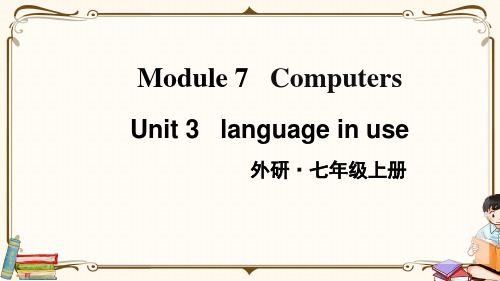
(3)疑问形容词:
what time (询问具体时刻) how old (询问年龄)
what colour (询问颜色)
how far ( 询问距离)
how often (询问频率)
how many (询问可数名词的数量)
— Where do you save your homework? — I save my homework in a document.
— _______________________________. — _______________________________.
2 Complete the conversations. —Where do your grandparents live? —They live in Australia. 1 —_H_o_w__d_o__I________ save my document? —Click “save”and “OK”. 2 —_W__h_a_t_d_o_e_s_h__e_d_o____ with his computer? —He sends email.
• 谁在房间里唱歌? ( who 作主语) Who is singing in the room?
• 在你手里的是什么? ( what 作主语) What’s in your hand?
(2)若疑问词作其他成分,即对其他成分 提问,其语序是: 特殊疑问词+一般疑问句或特殊疑问词+ be/助动词/情态动词十主语+谓语十其他?
4 My mother doesn’t __l_ik_e___ computer games.
初一英语(外研版)-M7 Unit 3 Language in use.-1教案
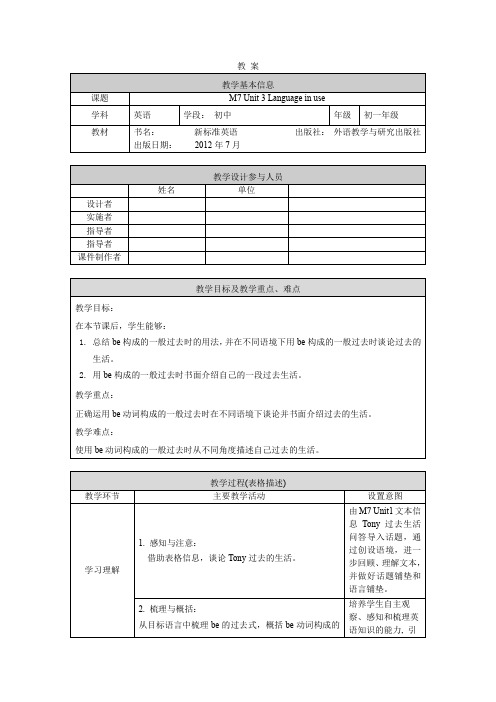
2.梳理与概括:
从目标语言中梳理be的过去式,概括be动词构成的一般过去时的意义与不同句式。
培养学生自主观察、感知和梳理英语知识的能力,引导其系统地归纳be构成一般过去时的用法。
应用实践
教案
教学基本信息
课题
M7 Unit3Language in use
学科
英语
学段:初中
年级
初一年级
教材
书名:新标准英语出版社:外语教学与研究出版社出版日期:2012年7月
教学设计参与人员
姓名
单位
设计者
实施者
指导者
指导者
课件制作者
教学目标及教学重点、难点
教学目标:
在本节课后,学生能够:
1. 总结be构成的一般过去时的用法,并在不同语境下用be构成的一般过去时谈论过去的生活。
2.用be构成的一般过去时书面介绍自己的一段过去生活。
教学重点:
正确运用be动词构成的一般过去时在不同语境下谈论并书面介绍过去的生活。
教学难点:
使用be动词构成的一般过去时从不同角度描述自己过去的生活。
教学过程(表格描述)
教学环节
主要教学活动
设置意图
学习理解
1.感知与注意:
借助表格信息,谈论Tony过去的生活。
聚焦文本语言,并实现语言和知识的迁移。通过创造性的书面介绍,笔头落实如何运用be构成的一般过去时介绍自己过去生活。
Homework
1. Ask and answer about the past life with yourclassmates.
(完整word版)外研版七上m7u3教学设计与反思.
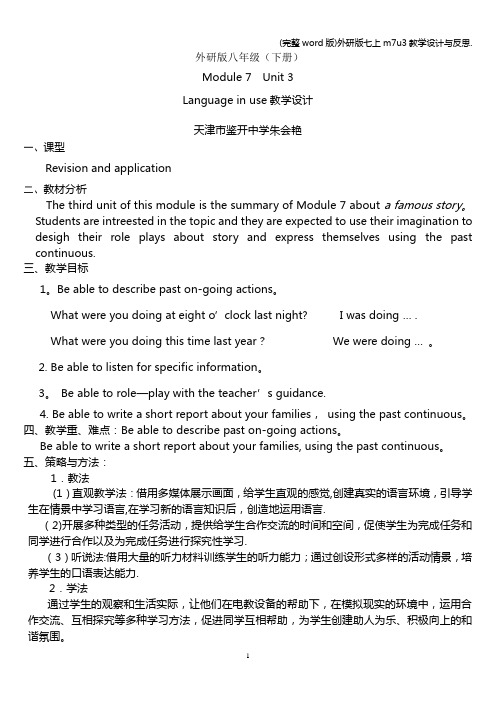
外研版八年级(下册)Module 7 Unit 3Language in use教学设计天津市鉴开中学朱会艳一、课型Revision and application二、教材分析The third unit of this module is the summary of Module 7 about a famous story。
Students are intreested in the topic and they are expected to use their imagination to desigh their role plays about story and express themselves using the past continuous.三、教学目标1。
Be able to describe past on-going actions。
What were you doing at eight o’clock last night? I was doing … .What were you doing this time last year?We were doing …。
2. Be able to listen for specific information。
3。
Be able to role—play with the teacher’s guidance.4. Be able to write a short report about your families,using the past continuous。
四、教学重、难点:Be able to describe past on-going actions。
Be able to write a short report about your families, using the past continuous。
(2021年整理)M7U3新单词讲义

(完整版)M7U3新单词讲义编辑整理:尊敬的读者朋友们:这里是精品文档编辑中心,本文档内容是由我和我的同事精心编辑整理后发布的,发布之前我们对文中内容进行仔细校对,但是难免会有疏漏的地方,但是任然希望((完整版)M7U3新单词讲义)的内容能够给您的工作和学习带来便利。
同时也真诚的希望收到您的建议和反馈,这将是我们进步的源泉,前进的动力。
本文可编辑可修改,如果觉得对您有帮助请收藏以便随时查阅,最后祝您生活愉快业绩进步,以下为(完整版)M7U3新单词讲义的全部内容。
(完整版)M7U3新单词讲义编辑整理:张嬗雒老师尊敬的读者朋友们:这里是精品文档编辑中心,本文档内容是由我和我的同事精心编辑整理后发布到文库,发布之前我们对文中内容进行仔细校对,但是难免会有疏漏的地方,但是我们任然希望 (完整版)M7U3新单词讲义这篇文档能够给您的工作和学习带来便利。
同时我们也真诚的希望收到您的建议和反馈到下面的留言区,这将是我们进步的源泉,前进的动力.本文可编辑可修改,如果觉得对您有帮助请下载收藏以便随时查阅,最后祝您生活愉快业绩进步,以下为〈(完整版)M7U3新单词讲义> 这篇文档的全部内容。
(完整版)M7U3新单词讲义M7 Unit 3 The world onlineWords (1)1.turn to转向;变成;求助于;致力于;开始行动拓展:turn短语:________ 转身;好转拒绝;把声音调低turn up turn offturn on turn overturn in 结果是;原来是① He had his proposal again making great 。
T_______,he ________ ______ the a____________ for help.尽管他作出很大努力,他的提议再次遭到拒绝….。
②The French pianist who had been praised very highly_____________________________________(结果令人大失所望).2.abundant adj 大量的;丰盛的;充裕的(同义词:_________________________________________________________________)① our country has a population, territory and resources。
外研版七年级英语上册教案 Moddule 7Unit 3 Language in use
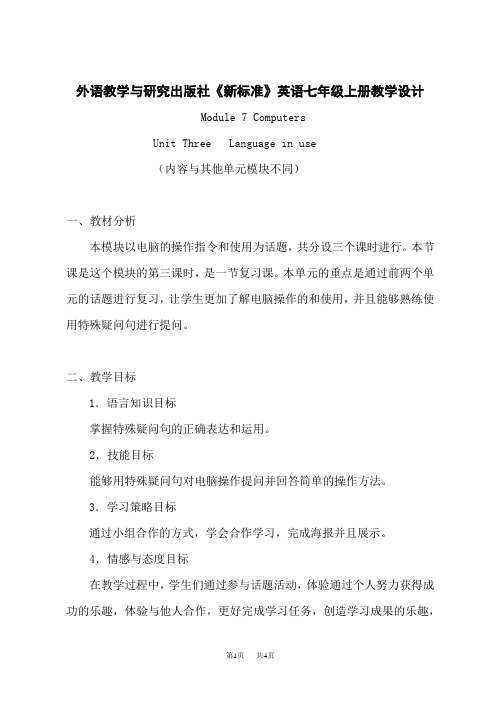
外语教学与研究出版社《新标准》英语七年级上册教学设计Module 7 ComputersUnit Three Language in use(内容与其他单元模块不同)一、教材分析本模块以电脑的操作指令和使用为话题,共分设三个课时进行。
本节课是这个模块的第三课时,是一节复习课。
本单元的重点是通过前两个单元的话题进行复习,让学生更加了解电脑操作的和使用,并且能够熟练使用特殊疑问句进行提问。
二、教学目标1.语言知识目标掌握特殊疑问句的正确表达和运用。
2.技能目标能够用特殊疑问句对电脑操作提问并回答简单的操作方法。
3.学习策略目标通过小组合作的方式,学会合作学习,完成海报并且展示。
4.情感与态度目标在教学过程中,学生们通过参与话题活动,体验通过个人努力获得成功的乐趣,体验与他人合作,更好完成学习任务,创造学习成果的乐趣,并且通过本课学习,引导学生正确合理的使用电脑,培养学生对待电子游戏的正确态度。
5.教学重点和难点熟练运用特殊疑问句并能正确表扬使用电脑做事情。
三、教学设计本节课是一节以电脑为话题的复习课。
在整个的教学设计中,教师主要采取的是“情境教学法”,教师尽可能为学生们创设能够启发他们思维的多元化的教学环境,指导学生在真实的情境中进行语言知识的复习、巩固、运用,培养学生良好的听说习惯和综合运用英语的能力。
四、教学过程与方法I. Eing-up[操作方式] 师生问好,通过搭建复述框架,复习前两个模块的话题并直接导入本课的主题。
[设计意图] 复习本模块课文,激活潜在知识,以旧知带新知。
II. ExperienceStep 2. Ask and answer.1. 组内两人合作,根据图片创设情景进行特殊疑问句的问答。
[设计意图] 强化特殊疑问句的操练练习,强调特殊疑问词的选择,并且在练习过程中让学生自己总结特殊疑问句的规律,2. 环游世界:通过对短文的一系列提问,帮助孩子了解拓展有关世界上第一台计算机的知识。
- 1、下载文档前请自行甄别文档内容的完整性,平台不提供额外的编辑、内容补充、找答案等附加服务。
- 2、"仅部分预览"的文档,不可在线预览部分如存在完整性等问题,可反馈申请退款(可完整预览的文档不适用该条件!)。
- 3、如文档侵犯您的权益,请联系客服反馈,我们会尽快为您处理(人工客服工作时间:9:00-18:30)。
1 Better late than never.迟做总比不做好。
【学习目标】能巩固本模块知识并活学活用。
【学习重点】词汇短语。
【学习难点】频度副词。
【学习过程】 一、自主学习 (一)课前复习1.How do you do your homework on the computer?___________,open a new e the mouse and click “______________”. ___________,use the keyboard _____ write your homework.___________,save the document.Click “save ” and write the name, click “save ” _______. ___________,print the document.Click “print ” and “______________”.(二)课堂引导自学1.一般来说,特殊疑问句的结构为“疑问词+ 一般疑问句?”。
如:1. —________ _______ Kate write her homework? —In the school library.6.—___________ writes the email to you? —Li Ming. Complete the conversations.1.--- ____________________ save my document? --- Click “save ” and “OK ”.2. --- ________________ with his computer? --- He sends emails.3. --- __________________ her computer? --- She uses her computer every Sunday.4. --- ___________________ emails to? --- I write emails to my friends.5. --- __________________________ every day? --- They send ten emails every day.三、成果检验(一)达标练习Fill in the blanks with the correct form of each word.1.Tony __________ (not see) his uncle, but he ________ (send) emails.2. We ______ (use) the Internet on our computer, but we __________ (not play) games.3. Daming ______________ (not use) a computer to do his homework, but he uses it to __________ (play) music.4. She _______ (make) travel plans on the Internet, but she _________ (not buy) tickets.5. We _____________ (not have) a computer at home, but we _________ (use) thecomputer at school.6. Mr Li usually ________ (use) a computerat work.7. My father _____________ (not write) his novels on his computer. 8. ______ you ________ (have) a computer at home? 9. Where _____ they _____ (live)?10. How many e-mails ________ Li Ming _____ (send) every week?初一上册英语学科导学案2 1 Better late than never.迟做总比不做好。
(二)拓展提升1. I have _____new computer. _____computer is in my room. A. a; The B. the; AC. a; / D. a; A2. We can listen to the songs __________ the computer. A. in B. at C. of D. on3. They often do _________ homework in the evening. A. my B. his C. their D. our4. Does Li Hong often ___ the train timetable on the Internet?A.checkB. ChecksC.to checkD.checking5. —___do you use a computer?—Twice a week.A. How long B. How oftenC. How many D. How much6. You can _______ music from the Internet.A. practise B. StartC. invite D. download7. I don’t have sisters ______brothers. I’m the only child in my family. A. and B. with C.but D. or 8. We use the _____ to click on the computer.A. laptop B. KeyboardC. mouse D. printer 9. I live on ______ floor. A. three B. the threeC. third D. the third10. To get more information, _________ this website, please. A. make B. ask C. play D. visit 11. — Do you often _______ to your friends?— No. I often write letters to them. A. send emails B. go onlineC. play games D. make plans12. Please _____ the computer. I want to shop online.A. use B. ChooseC. switch on D. look at 13. — ______does your mother often do on Sundays? — She often does housework with my father. A. Where B. How C. Who D. What14. I want to play basketball ___tomorrow.A. sometimes B. some timesC. sometime D. some time 15. — Good morning, class. Who isn’t ______ today?— Li Lei. He has got a bad cold. A. in hospital B. at schoolC. at table D. in bed 提高发展 (30分) ◆III. 完形填空 (每小题1分,共10分)Do you know computers? You can find computers in many families. I 46 a computer. I often use it to 47 my homework. First, I open a new 48 and use the mouse to click 49 . Next, I write my homework 50 the new document. 51 , I save it and print it. Sometimes I use 52 computer to send emails. I have a good 53 in another city and I don ’t often see him. So I often send emails to him. I can also get 54 information from theInternet. 55 else (其他的) do I use i t for? on Sunday I play computer games on it. They’revery interesting. I like my computer very much. Do you have one? What do you do on it? ( )46. A. save B. close C. have D. start ( )47. A. read B. do C. open D. print ( )48. A. computer B. monitorC. email D. document ( )49. A. it B. them C. her D. him ( )50. A. to B. in C. at D. from ( )51. A. Last B. Again C. Finally D. First ( )52. A. a B. the C. / D. an( )53. A. friend B. sisterC. weekend D. plan( )54. A. every B. lot C. many D. much ( )55. A. How B. Where C. Which D. WhatA computer game is very popular (流行的) today. Many young office workers and students likeplaying it. People can “farm ” on a piece of “land ”, and “grow vegetables, flowers, and fruits ” on the Net. They can make some e-money to buy more things. Here are different ideas about it.Henry: I don ’t like any computer games. I think it ’s a waste (浪费) of time.Laura: I live in the city and I long for (渴望) the life on the farm. So I like this game very much. Allen: I often play this game with my friends. We have fun (乐趣) playing it.Ivy: I’m a student. I think we students can use computers to do many useful things. But why do some of us choose to play computer games? It’s bad for our studies. ( )56. Acco rding to the passage, people can’t ______ in the game. A. grow vegetables B. make e-money C. buy things D. watch movies( )57. Of the four people, ______ doesn’t / don’t like the game.A. one B. two C. three D. four ( )58. The word “useful” means “____” in Chinese.A. 无效的 B . 有益的C. 遗憾的 D. 消极的 ( )59. Which is TRUE according to the passage?A. Laura lives on the farm.B. Allen is happy to play the game.C. Ivy doesn’t like to study.D. Henry usually plays computer games. ( )60. Where can we see this passage?A. In a computer magazine. B. In a science book.C. On a train timetable.D. On a movie ticket.Do you know what an e-friend is? You make a friend with him or her by sending emails. Havinge-friends is good for you. You can tell them your family, problems (问题) and good things. 64. Theycan teach you many things and help you get out of problems. Some of them may send you e-cards on your birthday. If your e-friends come from English-speaking countries (国家), they will help you learn English. 65. Writing to them in English is good for your English learning. Some of them may invite you to their countries, and take you to visit their countries.Where can you make e-friends? You can visit some websites. There are many boys and girls, and you can make friends with some of them. A. 根据短文,回答下列问题。
